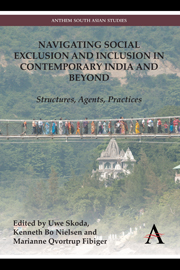 Navigating Social Exclusion and Inclusion in Contemporary India and Beyond
Navigating Social Exclusion and Inclusion in Contemporary India and Beyond Published online by Cambridge University Press: 05 September 2013
Social exclusion has in recent years received increasing attention from scholars and academics working on issues such as poverty, inequality and development. Indeed, already 15 years ago Else Øyen lamented the fact that the idea of social exclusion had made such rapid inroads into academia that scholars were now ‘running all over the place arranging seminars and conferences to find a researchable content in an umbrella concept for which there is limited theoretical underpinning’ (quoted in Sen 2000, 5). The present volume is the outcome of one such seminar, held in Aarhus in Denmark in the spring of 2010. The aim of the seminar was, however, not to provide further theoretical ‘underpinnings’ to the concept of social exclusion, but rather to examine its empirical applicability in contemporary India: How does an increasingly liberalized Indian economy contribute to processes of in- and exclusion? To what extent does the deepening of Indian democracy offer hitherto marginalized social groups new opportunities for pursuing strategies of inclusion through, or in opposition to, the state? And how does ‘development’ alter the social terrain on which inequalities are negotiated and played out? Finally, how are these processes intertwined? These and related questions emerged as focal points for discussion during the seminar, the spirit of which we seek to convey in this volume. The contributions contained here all seek to considerably expand the notion of social exclusion by applying it in the study of a broad range of cases.
To save this book to your Kindle, first ensure [email protected] is added to your Approved Personal Document E-mail List under your Personal Document Settings on the Manage Your Content and Devices page of your Amazon account. Then enter the ‘name’ part of your Kindle email address below. Find out more about saving to your Kindle.
Note you can select to save to either the @free.kindle.com or @kindle.com variations. ‘@free.kindle.com’ emails are free but can only be saved to your device when it is connected to wi-fi. ‘@kindle.com’ emails can be delivered even when you are not connected to wi-fi, but note that service fees apply.
Find out more about the Kindle Personal Document Service.
To save content items to your account, please confirm that you agree to abide by our usage policies. If this is the first time you use this feature, you will be asked to authorise Cambridge Core to connect with your account. Find out more about saving content to Dropbox.
To save content items to your account, please confirm that you agree to abide by our usage policies. If this is the first time you use this feature, you will be asked to authorise Cambridge Core to connect with your account. Find out more about saving content to Google Drive.